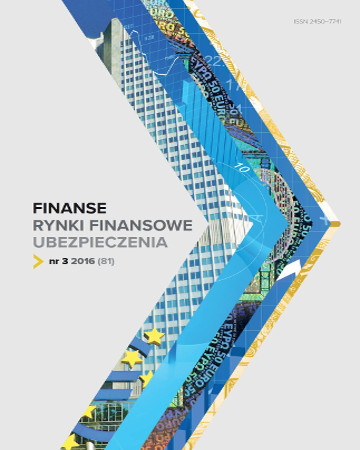
ISSN: 2450-7741
OAI
DOI: 10.18276/frfu.2017.1.85-32


Issue archive /
1/2017 (85)
Rozsądny zysk w modelach biznesu przedsiębiorstw sektorów regulowanych
(Reasonabl e Profit In Th e Business Models Of Regulated Sectors)
| Authors: |
Marek
Jabłoński

Wyższa Szkoła Biznesu w Dąbrowie Górniczej |
| Keywords: | business model reasonable profit regulated sectors the value of the company strategy |
| Data publikacji całości: | 2017 |
| Page range: | 17 (389-405) |
Abstract
Purpose – The aims of the article is to explain the determinants and impact of an approach based on the concept of reasonable profit to the development of business models of companies operating under strong legal regulations. Article indicates the principles of design business models of companies in regulated sectors for maintain profit value at a fixed legally level. Research methodology – In article was presented a broad review of the literature and selected conclusions on how to design business models, taking into account the concept of reasonable profit. Results – Based on the review of the literature, the author’s experience and own analyzes should be stated that the design of business model based on the reasonable profit requires a detailed analysis and calculations. The results of the analysis indicate the need to integrate strategic approach especially in terms of understanding the place and role of the concept of the business model to financing approach to the design of business models, which provide the proper functioning and maintain of legally regulated financial result. Originality/value – In article indicated that the integration of the principles of creative design business models and analytical approach for estimating the value of reasonable profit is the precondition for the effective design of new business ventures in selected areas regulated economy sectors.
Download file
Article file
Bibliography
| 1. | Aversaa, P., Haefligera, S., Rossib, A., Baden-Fuller, C. (2015). From business model to business modelling: modularity and manipulation. Business Models and Modelling Advances in Strategic Management, 33. |
| 2. | Barney, J.B. (1991). Firm Resources and Sustained Competitive Advantage. Journal of Management, 17, 99–120. |
| 3. | Barney, J.B. (2001). Is the Resource-Based Theory a Useful Perspective for Strategic Management Research? Yes. Academy of Management Review, 26 (1), 41–56. |
| 4. | Christensen, C., Johnson, M. (2009). What Are Business Models, and How Are They Built? Harvard Business School Module. |
| 5. | Dyrektywa Parlamentu Europejskiego i Rady 2008/6/WE z dnia 20 lutego 2008 r. zmieniająca dyrektywę 97/67/WE w odniesieniu do pełnego urzeczywistnienia rynku wewnętrznego usług pocztowych Wspólnoty. |
| 6. | Dyrektywa Parlamentu Europejskiego i Rady 2014/24/UE z dnia 26 lutego 2014 r. w sprawie zamówień publicznych, uchylająca dyrektywę 2004/18/WE. |
| 7. | Friedman, M., Friedman, R. (1980). Free to Choose: A Personal Statement. New York: Harcourt Brace Jovanovich. |
| 8. | Jabłoński, M. (2013). Kształtowanie modeli biznesu w procesie kreacji wartości przedsiębiorstw. Warszawa: Difin. |
| 9. | Johann, D., Klang, H., Wallnöfer, M., Hacklin, F. (2010). The anatomy of the business model: a syntactical review and research agenda. Paper to be presented at the Summer Conference 2010 on “Opening Up Innovation: Strategy, |
| 10. | Organization and Technology” at Imperial College London Business School. June 16–18. |
| 11. | Johnson, M.W., Christensen, C.M., Kagermann, H. (2008). Reinventing Your Business Model. Harvard Business Review, 12, 57–68. |
| 12. | Komisja europejska (2011). Komunikat Komisji w sprawie stosowania reguł Unii Europejskiej w dziedzinie pomocy państwa w odniesieniu do rekompensaty z tytułu usług świadczonych w ogólnym interesie gospodarczym. Bruksela, 20.12.2011, K(2011) 9404, wersja ostateczna. |
| 13. | Kunkiel-Kryńska, A. Orzecznictwo Trybunału Sprawiedliwości UE – kryteria Teckal. Pobrane z: http://eurozamowienia.pl/wpis,62,Orzecznictwo_Trybunalu_Sprawiedliwosci_UE_–_kryteria_Teckal.html (24.12.2016). |
| 14. | Narodowe Strategiczne Ramy Odniesienia 2007–2013. Program Operacyjny Infrastruktura i Środowisko, Regionalne Programy Operacyjne, Wytyczne w zakresie reguł dofinansowania z programów operacyjnych podmiotów realizujących obowiązek świadczenia usług publicznych w ramach zadań własnych jednostek samorządu terytorialnego w gospodarce odpadami. Ministerstwo Rozwoju Regionalnego. |
| 15. | Rappaport, A. (1999). Wartość dla akcjonariuszy. Warszawa: WIG-Press. |
| 16. | Rozporządzenie (WE) nr 1370/2007 Parlamentu Europejskiego i Rady z dnia 23 października 2007 r. dotyczące usług publicznych w zakresie kolejowego i drogowego transportu pasażerskiego oraz uchylające rozporządzenia Rady (EWG) nr 1191/69 i (EWG) nr 1107/70. |
| 17. | Slywotzki, A., Morrison, D.J., Andelman, B. (2000). Strefa zysku. Warszawa: PWE. |
| 18. | Towards Integrated Reporting (2011). Communicating Value in the 21st Century. International Integrated Reporting Committee, September. |